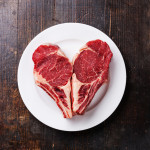By David Blyweiss, M.D., Advanced Natural Wellness
Heart disease is still the number one killer of both women and men.
You already know the usual advice for heart health: eat right, don’t smoke, exercise regularly and lessen your stress levels.
But here are some ways to protect yourself from heart disease that you may not have heard of:
Are You Suffering From...
- Love handles and a pot belly
- Romance that isn't what it used to
- Forgetfulness and inattention
- Low (or no) strength and endurance
- A sex drive that's shifted into neutral...or worse
If so...you may have Mature Male Burnout. Click here to discover more about this unique condition and what you can do about it.
- Boost the sunshine vitamin. Getting enough vitamin D can reduce your risk of heart disease by as much as 47 percent.1 The best source is direct exposure to sunlight (without sunscreen) for 10-15 minutes per day. But, as you’ve heard me say time and again, it’s also important to take vitamin D supplements. I recommend 2,000 IU per day for cardio-protective benefits.
- Supplement with sterols. These naturally occurring substances block the body’s absorption of cholesterol, and some studies suggest that sterols can lower LDL by as much as 15% without affecting HDL levels.2 Take 2 grams of supplemental sterols with your 2 largest meals of the day for best results.
- Eat more cranberries. They keep blood cells from clumping together, increase HDL levels and have potent anti-inflammatory effects. The antioxidants in cranberries also keep LDL cholesterol from oxidizing. And oxidized cholesterol is more likely to stick to artery walls and cause atherosclerosis. Skip the sugary cranberry juice “cocktail,” and add one ounce of 100% cranberry juice to water or your usual juice. Or take 400 mg of supplemental cranberry extract daily for the same benefits.
- Don’t skimp on protein. Research shows eating adequate protein lowers heart disease risk by as much as 26%.3 Good sources include fatty fish, organic chicken and eggs. Eggs are also high in B vitamins and betaine that can lower homocysteine levels by as much as 75%. Homocysteine is a dangerous compound that can cause narrowing of the arteries.
- Kill the grill. Grilling forms compounds in meat that may cause inflammation and oxidative damage, both of which increase your risk of heart disease. For safer grilling, use lean meat and marinate it in lemon juice, olive oil and herbs like oregano and rosemary. Or wrap foods in foil pouches and place them on the grill to avoid direct contact with heat. Even better, dust off your crock pot and cook meat the old-fashioned way: slow and with low heat.
- Drink filtered coffee. Unfiltered varieties like espresso and French-pressed contain diterpenes and other compounds which may increase the risk of heart disease. But even if you filter your coffee, drink it in moderation. Too much coffee can increase blood pressure and arterial stiffness. Plus, drinking more than 6 cups per day increases cholesterol and boosts blood levels of heart-damaging homocysteine by as much as 10%. Green tea makes a great alternative. Its antioxidant flavonoids relax blood vessels and thin blood.
- Wash your hands often. People with the highest levels of antibodies—substances produced when the body is fighting off infections—also had more clogging of their arteries. The same goes for brushing your teeth. Studies show a correlation between gum disease, cavities and an increased risk of heart disease.
- Learn to love Indian food. It’s rich in heart-healthy turmeric, the spice that gives curry its color. Turmeric contains curcuminoids that can reduce inflammation, prevent atherosclerosis and may lower total cholesterol. Not an Indian-food fan? Take turmeric capsules. Dosages range from 600—1,200 mg per day standardized to 90% or more curcuminoids.
- Add some arginine. This amino acid is a precursor to nitric oxide, which keeps arteries flexible, increases blood flow and improves blood vessel function.4 Some studies suggest that L-arginine reduces the risk of atherosclerosis and can lower blood pressure. Recommended dosages range from 750 mg to 3 grams per day, taken between meals.
If you want to lower your risk for heart disease even the little things count. Incorporate as many of these tips into your daily life as you can to help keep your ticker going strong for many years to come.
References:
- “Studies find treating vitamin D deficiency significantly reduces heart disease risk.” Physorg. Available at www.physorg.com/news187879711.html.
- Athyros VG. Effect of a plant stanol ester-containing spread, placebo spread, or Mediterranean diet on estimated cardiovascular risk and lipid, inflammatory and haemostatic factors. Nutrition, Metabolism and Cardiovascular Disease. 2011;21:213-221.
- Bernstein AM. Major dietary protein sources and risk of coronary heart disease in women. Circulation. 2010;122:876-883.
- Orozco-Gutiérrez JJ. Effect of L-arginine or L-citrulline oral supplementation on blood pressure and right ventricular function in heart failure patients with preserved ejection fraction. Cardiology Journal. 2010;17:612-618






